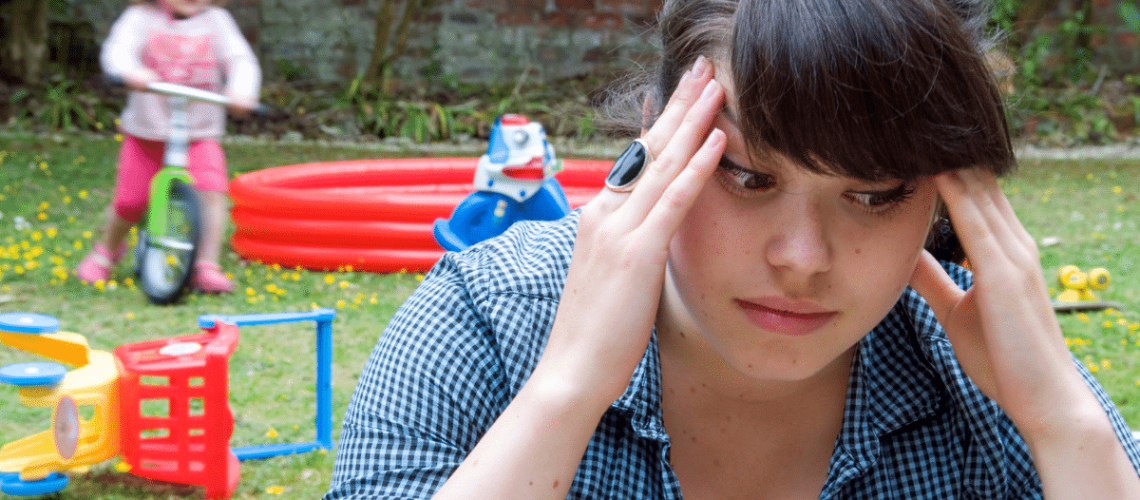Do you ever feel unsure about how to respond to your child?
Whether it’s a request they make of you or, like instructor Michelle Hartop shares in this post, an idea they have for play, something about your child's behavior just leaves you unsure or uneasy.
Should you set a limit, or let things play out?
How can you parent confidently when your thinking feels fuzzy?
When you feel stuck, unsure and second-guessing?
In this post, Michelle explores a time she found herself stuck and shares how she moved through the stuck feelings to connection and a resolution her family felt good about.
Feeling unsure in my parenting
When my daughter was seven she had a friend over for a play date. They were having a lot of fun together playing outside. At one point they came in asking for more water because they were drowning ants. My heart sank at this information.
“Nope,” I said lightly. “No more ants need to drown today.”
“Well, we'll just stomp on them!” my daughter and her friend replied in unison. (Did they rehearse this response?!)
“Hey,” I replied playfully. “Ants have a right to live too!”
“We like stomping them!” they said enthusiastically, and my heart sank again.
I didn't want my daughter and her friend stomping on the ants.
I held back from saying this out loud. I imagined the judgmental tone I felt at the moment would send the message to her that she has to keep things from me and hide what's going on with her. I didn’t want that.
But…I didn't feel right NOT saying anything either. In this moment of internal conflict, my thinking started to swirl and get fuzzy. I felt stuck between EITHER letting them do it, OR stopping them from doing it. Neither felt quite right to me and I had no idea what to do!
Exploring why I felt conflicted
The girls headed back outside and I decided to take some quiet time checking in with what was going on with me. What was creating my confusion and fuzzy thinking?
I took a few calming breaths and settled into my body then asked myself, “What am I imagining this behavior means?”
The answer came quickly. I viewed stomping on ants to mean the girls had a total disregard for life.
Given all the heart-breaking violence making the news at the time, it wasn’t surprising that my concern for and desire to respect all life would be triggered right in that moment by their wanting to stomp on ants.
Their play touched on a very deep place of powerlessness within myself. No wonder I couldn’t think. On one hand, their play was innocent, on the other I was feeling sad and worried about the shocking events that kept making headlines.
In that moment I couldn’t unlink the two.
How I got my thinking back on track
I decided to take a minute to listen to myself, the way my Listening Partner might, and give myself some empathy. I placed my hand on my heart and took a minute to just feel the sadness and worry without trying to solve it or push it away.
I silently acknowledged to myself that it was hard to hear about all the suffering happening in the world and easy to feel so powerless about it all. I felt a sense of comfort inside as I took this time to just be present with my feelings.
I then reminded myself I didn’t have to save the world or end all violence. I had a wonderful opportunity to connect with the girls in the here and now. From this place, I felt my sense of power return and noticed my thinking clear up.
I was no longer confused about the girls’ goodness or my ability to step in well.
I no longer felt small trying to conquer a societal problem that was way bigger than me.
Connecting and sharing my value through play
In this moment of clarity the question came to me: how do I connect with these girls, right where they are, while also sharing my value of respecting all life?
I knew play was the answer. It was the best way to connect with the girls right where they were, and by letting them take on the more powerful role it would probably get to the core of any powerlessness they were feeling that made them want to have power over the ants. Plus, laughter always seems to work better than lectures.
I went outside to be with them and playfully announced, “I'm here to catch ant stompers!” They giggled at my proclamation and ran around the yard.
I chased them, mostly letting them get away, but occasionally catching them with a vigorous snuggle. I playfully stood up for the ants by giving them a voice, “Hey! We deserve to live!” I had the ants chant.
The girls laughed and giggled while “taunting” me with more ant stomping.
I chased them around the yard until we were all tired.
When I was ready to stop I told them what fun I'd had with them, and then I went back inside.
Laughter is great at relieving tension and fear (often the driving force behind aggressive behavior) so I felt confident my message was heard through the playful connection and that no lecture or directive was needed.
About a minute later my daughter came inside and told me, “We're not stomping ants anymore. We're going to make a house and obstacle course for a beetle!”
I smiled.
It felt like a win for all of us, even the ants! In that moment I felt a little more hopeful for the world.
Tips to get your thinking unstuck in the moment
If you’re feeling stuck in either/or thinking, give yourself some space. As long as the kids are safe there’s probably nothing you need to do right that second.
Acknowledge your feelings
- Let yourself slow down and notice how you’re feeling. If you have the ability to reach out to a friend or Listening Partner for support, take that time to call or even text if calling isn’t an option at the moment.
- Offer empathy and encouragement to yourself. You might try placing your hand on your heart or gently cupping your face with your hands. Offer caring to yourself for how hard it feels in the moment and confidence that you will find your way through.
- If you enjoy journaling, writing can be helpful for better connecting to what we’re thinking and feeling in the moment.
Question your thinking
- Ask yourself: “What am I imagining my child’s behavior to mean?” Notice if your imaginings take you to a miserable future for you or your child. Do you think “They’ll always…” or “They’ll never…” Naming the extreme nature of our worries can help bring some perspective to us when we see it is out-of-sync with the present moment or simply not true. With a more balanced perspective, we can then be more present to connecting with our child in the moment instead of putting all of our energy into an imagined (unhappy) future.
- Make a note if your worries have you imagining your child suffering a fate like someone else you know who is unhappy or struggling in life. Sometimes our child’s “simpler” issues can trigger our unresolved grief around ourselves, friends, or family members who suffered or are currently hurting. These feelings can easily get projected onto our kiddos and increase our worries. Take time to notice if this might be happening, and if it is, find someone who listens well so you can process these feelings and see your child more clearly.
Try Getting Playful
- Kids love to play, especially the type of play where they get to be the most powerful and the grown-up plays the silly, clumsy, and clueless one.
- Check out the Hand in Hand website for inspiration like: how one mom turned a stressful bathtime around with play, how to respond playfully with a toddler, and how play can help you get out the door on time.
Had enough of tantrums and time-outs?
In this free class you'll learn what drives kids hard-to-handle behaviors, and you'll get practical, science-backed tools to use with defiance, tantrums, separation anxiety, crying and more, so you can calmly parent with confidence in a way that actually supports your child.
Watch now or later! Book a time to watch that's most convenient for you.


